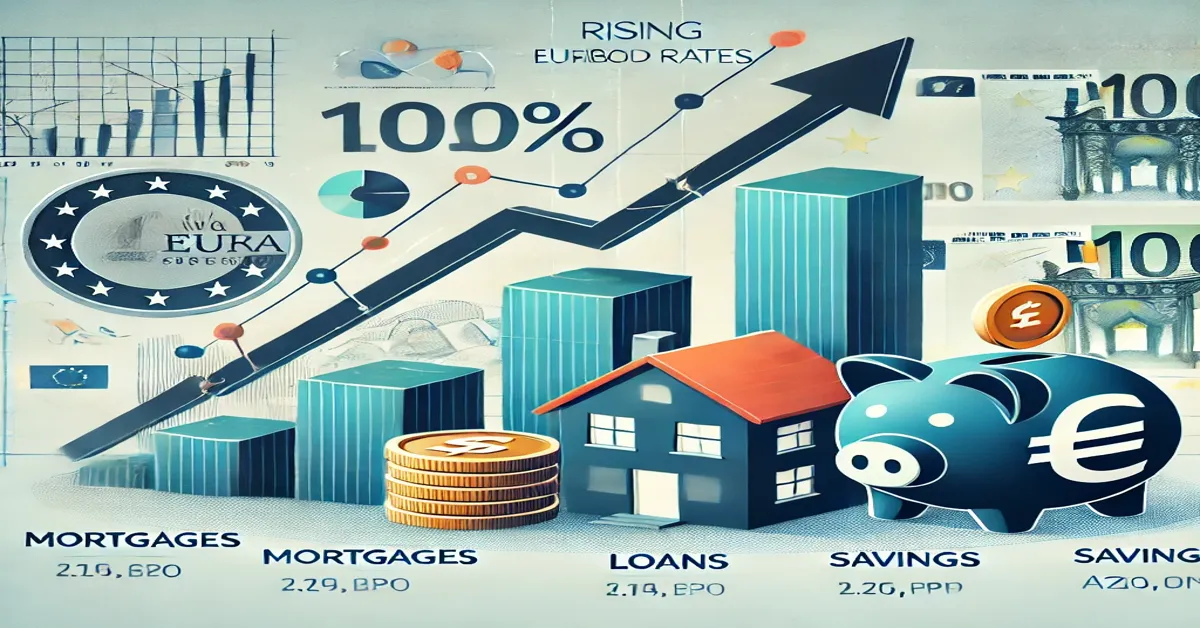The Euribor (Euro Interbank Offered Rate) is a key benchmark that reflects the average interest rate at which European banks lend to each other in euros. This rate significantly influences the cost of various financial products, including mortgages, loans, and savings accounts, especially in the Eurozone. The recent rise in Euribor rates is impacting consumers and financial markets alike – https://finanzasdomesticas.com/euribor-sube/.
What is Euribor and Why is It Important?
Euribor is one of the most critical benchmarks for determining interest rates across Europe. Financial institutions use Euribor to set rates for products like variable-rate mortgages and consumer loans. Because it is calculated daily based on the borrowing rates of European banks, changes in the Euribor can ripple across the economy, affecting everything from household spending to business investments – https://finanzasdomesticas.com/euribor-sube/.
As the European Central Bank (ECB) raises interest rates in response to inflationary pressures, the Euribor rate increases, leading to higher borrowing costs. This surge in Euribor, observed through late 2023 and into 2024, marks a sharp departure from the historically low rates seen in the years following the 2008 financial crisis – https://finanzasdomesticas.com/euribor-sube/.
The Rise in Euribor and Its Causes
Several factors are contributing to the recent rise in Euribor rates:
- Inflation: Inflation across the Eurozone has led the ECB to tighten its monetary policy, increasing interest rates to curb inflation. As the cost of borrowing rises for banks, this increase is passed on to consumers in the form of higher Euribor rates.
- Monetary Policy: The ECB has raised its interest rates in response to economic growth and inflation. Higher Euribor rates are a direct result of this policy adjustment.
- Economic Recovery: Post-pandemic economic recovery has spurred demand for credit. This heightened demand for loans also contributes to the rise in Euribor, as banks adjust their lending rates accordingly.
Impacts on Mortgages and Loans
The most direct impact of rising Euribor rates is felt by homeowners with variable-rate mortgages. As the Euribor increases, so do the monthly payments for these borrowers. A family with a €200,000 variable-rate mortgage tied to the Euribor could see their payments increase by hundreds of euros per month, depending on the scale of the Euribor hike. In contrast, those with fixed-rate mortgages are protected from these fluctuations, offering some stability amidst rising rates – https://finanzasdomesticas.com/euribor-sube/.
For consumers with personal loans or businesses with variable-rate loans, the cost of servicing debt will increase, which can strain budgets and reduce disposable income for other expenses. At the same time, for savers, rising Euribor rates could lead to better returns on savings accounts, offering some positive outcomes – https://finanzasdomesticas.com/euribor-sube/.
What Households Can Do to Mitigate Rising Euribor Rates
- Refinance Mortgages: Homeowners with variable-rate mortgages may want to consider refinancing to a fixed-rate mortgage to lock in stable monthly payments before rates rise further.
- Increase Savings: With rising Euribor rates, savers can benefit from higher interest rates on savings accounts and fixed-term deposits, potentially earning more on their savings.
- Adjust Budgets: It’s essential to revisit household budgets to prepare for higher monthly payments, especially if mortgages or loans are tied to the Euribor.
Broader Economic Implications
The rise in Euribor is not only affecting individual borrowers but also the broader economy. Higher borrowing costs can lead to reduced consumer spending, which may slow economic growth. For businesses, increased debt servicing costs could result in delayed investments or cutbacks in hiring, adding further pressure on the economic recovery – https://finanzasdomesticas.com/euribor-sube/.
Additionally, the real estate market is closely tied to Euribor rates. Rising rates could dampen demand for mortgages, potentially cooling down property markets that have seen rapid price increases in recent years – https://finanzasdomesticas.com/euribor-sube/.
Conclusion
As the Euribor continues to rise in response to inflation and other economic factors, it’s essential for households and businesses to stay informed and adjust their financial strategies accordingly. Whether you’re a borrower facing higher payments or a saver looking for better returns, understanding the implications of Euribor changes is crucial for making sound financial decisions – https://finanzasdomesticas.com/euribor-sube/.
FAQs
1. What is Euribor, and why does it matter?
Euribor (Euro Interbank Offered Rate) is a benchmark interest rate that influences the cost of mortgages, loans, and savings accounts across Europe. It reflects the average rate at which European banks lend to each other and is crucial for financial products tied to variable interest rates – https://finanzasdomesticas.com/euribor-sube/.
2. How does a rising Euribor affect my mortgage?
If you have a variable-rate mortgage, a rise in Euribor will increase your monthly payments. Fixed-rate mortgage holders are unaffected by these changes.
3. What factors are driving the increase in Euribor?
The main factors include rising inflation, tighter monetary policy from the European Central Bank, and increased demand for credit as economies recover from the pandemic.
4. Can I protect myself from rising Euribor rates?
Yes, you can consider refinancing to a fixed-rate mortgage or increasing savings to benefit from higher interest rates. Adjusting your budget to account for potential increases in payments is also advisable.
5. How do rising Euribor rates affect the broader economy?
Higher Euribor rates can lead to reduced consumer spending and investment, slowing down economic growth. It also impacts the real estate market, as higher borrowing costs may reduce demand for mortgages.
6. Are there any benefits to rising Euribor rates?
For savers, rising Euribor rates can lead to higher returns on savings accounts and fixed-term deposits.

